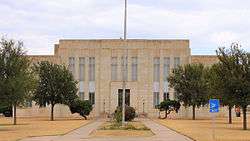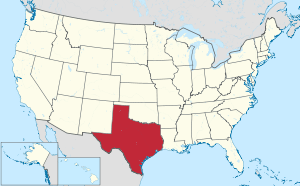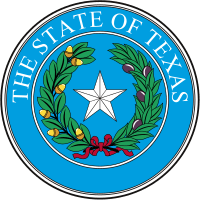Knox County, Texas
Knox County is a county located in the U.S. state of Texas. As of the 2010 census, its population was 3,719.[1] Its county seat is Benjamin.[2] The county was created in 1858 and later organized in 1886.[3] It is named for Henry Knox, an American Revolutionary War general.[4]
Knox County | |
|---|---|
 The Knox County Courthouse in Benjamin | |
 Location within the U.S. state of Texas | |
 Texas's location within the U.S. | |
| Coordinates: 33°37′N 99°44′W | |
| Country | |
| State | |
| Founded | 1886 |
| Named for | Henry Knox |
| Seat | Benjamin |
| Largest city | Munday |
| Area | |
| • Total | 855 sq mi (2,210 km2) |
| • Land | 851 sq mi (2,200 km2) |
| • Water | 4.9 sq mi (13 km2) 0.6%% |
| Population (2010) | |
| • Total | 3,719 |
| • Density | 4.4/sq mi (1.7/km2) |
| Time zone | UTC−6 (Central) |
| • Summer (DST) | UTC−5 (CDT) |
| Congressional district | 13th |
| Website | www |
The 1932 Texas Republican gubernatorial nominee, Orville Bullington, resided in Knox County and served as county attorney early in his career.
Knox County is represented in the Texas House of Representatives by the Republican James Frank, a businessman from Wichita Falls.
Geography
According to the U.S. Census Bureau, the county has a total area of 855 square miles (2,210 km2), of which 851 square miles (2,200 km2) is land and 4.9 square miles (13 km2) (0.6%) is water.[5]
Major highways





Adjacent counties
- Foard County (north)
- Baylor County (east)
- Haskell County (south)
- King County (west)
- Stonewall County (southwest)
Notable geographic features
Demographics
| Historical population | |||
|---|---|---|---|
| Census | Pop. | %± | |
| 1880 | 77 | — | |
| 1890 | 1,134 | 1,372.7% | |
| 1900 | 2,322 | 104.8% | |
| 1910 | 9,625 | 314.5% | |
| 1920 | 9,240 | −4.0% | |
| 1930 | 11,368 | 23.0% | |
| 1940 | 10,090 | −11.2% | |
| 1950 | 10,082 | −0.1% | |
| 1960 | 7,857 | −22.1% | |
| 1970 | 5,972 | −24.0% | |
| 1980 | 5,329 | −10.8% | |
| 1990 | 4,837 | −9.2% | |
| 2000 | 4,253 | −12.1% | |
| 2010 | 3,719 | −12.6% | |
| Est. 2019 | 3,664 | [6] | −1.5% |
| U.S. Decennial Census[7] 1850–2010[8] 2010–2014[1] | |||
As of the census[9] of 2000, there were 4,253 people, 1,690 households, and 1,166 families residing in the county. The population density was 5 people per square mile (2/km²). There were 2,129 housing units at an average density of 2 per square mile (1/km²). The racial makeup of the county was 74.35% White, 6.91% Black or African American, 1.08% Native American, 0.24% Asian, 0.09% Pacific Islander, 14.77% from other races, and 2.56% from two or more races. 25.09% of the population were Hispanic or Latino of any race.
There were 1,690 households out of which 30.70% had children under the age of 18 living with them, 56.00% were married couples living together, 9.90% had a female householder with no husband present, and 31.00% were non-families. 29.60% of all households were made up of individuals and 17.90% had someone living alone who was 65 years of age or older. The average household size was 2.44 and the average family size was 3.02.
In the county, the population was spread out with 27.70% under the age of 18, 5.60% from 18 to 24, 22.90% from 25 to 44, 21.00% from 45 to 64, and 22.70% who were 65 years of age or older. The median age was 40 years. For every 100 females there were 89.40 males. For every 100 females age 18 and over, there were 87.80 males.
The median income for a household in the county was $25,453, and the median income for a family was $30,602. Males had a median income of $25,571 versus $20,865 for females. The per capita income for the county was $13,443. About 17.10% of families and 22.90% of the population were below the poverty line, including 35.20% of those under age 18 and 15.20% of those age 65 or over.
Education
The following school districts serve Knox County:
- Benjamin ISD
- Crowell ISD (mostly in Foard County; small portion in King County)
- Knox City-O'Brien Consolidated ISD (partly in Haskell County)
- Munday Consolidated ISD (small portions in Haskell and Throckmorton counties)
- Seymour ISD (mostly in Baylor County)
Bobby Boatright Memorial Music Camp
The city of Goree in Knox County is the site of the annual Bobby Boatright Memorial Music Camp, an event for aspiring Western Swing musicians of all ages to showcase their musical talents. The camp's namesake was a fiddle player who was originally from Goree. The camp was profiled in a story that aired on July 21, 2010 on National Public Radio's Morning Edition program.[10]
Communities
Town
Politics
| Year | Republican | Democratic | Third parties |
|---|---|---|---|
| 2016 | 78.9% 1,078 | 18.1% 247 | 3.1% 42 |
| 2012 | 76.8% 1,160 | 22.0% 332 | 1.2% 18 |
| 2008 | 72.1% 986 | 26.8% 367 | 1.1% 15 |
| 2004 | 69.7% 1,081 | 29.9% 464 | 0.5% 7 |
| 2000 | 60.1% 947 | 39.2% 617 | 0.8% 12 |
| 1996 | 39.0% 599 | 51.1% 785 | 10.0% 153 |
| 1992 | 28.7% 521 | 47.1% 854 | 24.2% 440 |
| 1988 | 42.9% 765 | 56.9% 1,013 | 0.2% 4 |
| 1984 | 52.6% 1,027 | 47.2% 921 | 0.2% 4 |
| 1980 | 39.8% 783 | 59.1% 1,163 | 1.1% 22 |
| 1976 | 26.8% 551 | 72.7% 1,498 | 0.5% 11 |
| 1972 | 63.8% 1,148 | 35.4% 638 | 0.8% 14 |
| 1968 | 27.3% 580 | 57.5% 1,222 | 15.3% 325 |
| 1964 | 19.8% 439 | 80.0% 1,773 | 0.2% 4 |
| 1960 | 34.8% 729 | 65.1% 1,365 | 0.2% 4 |
| 1956 | 39.8% 835 | 60.1% 1,262 | 0.1% 3 |
| 1952 | 39.9% 1,033 | 60.1% 1,556 | 0.0% 1 |
| 1948 | 7.8% 157 | 89.2% 1,792 | 2.9% 59 |
| 1944 | 7.3% 156 | 83.3% 1,785 | 9.4% 201 |
| 1940 | 13.0% 253 | 87.0% 1,699 | |
| 1936 | 8.6% 171 | 91.2% 1,823 | 0.3% 6 |
| 1932 | 6.0% 102 | 93.8% 1,600 | 0.2% 4 |
| 1928 | 55.7% 992 | 44.0% 784 | 0.3% 5 |
| 1924 | 23.5% 455 | 72.3% 1,399 | 4.2% 81 |
| 1920 | 15.4% 159 | 75.1% 773 | 9.5% 98 |
| 1916 | 6.1% 64 | 83.8% 884 | 10.1% 107 |
| 1912 | 3.7% 32 | 75.1% 643 | 21.2% 181 |
See also
References
- "State & County QuickFacts". United States Census Bureau. Archived from the original on October 18, 2011. Retrieved December 18, 2013.
- "Find a County". National Association of Counties. Archived from the original on 2011-05-31. Retrieved 2011-06-07.
- "Texas: Individual County Chronologies". Texas Atlas of Historical County Boundaries. The Newberry Library. 2008. Retrieved May 24, 2015.
- Gannett, Henry (1905). The Origin of Certain Place Names in the United States. Government Printing Office. p. 177.
- "2010 Census Gazetteer Files". United States Census Bureau. August 22, 2012. Retrieved May 2, 2015.
- "Population and Housing Unit Estimates". United States Census Bureau. May 24, 2020. Retrieved May 27, 2020.
- "U.S. Decennial Census". United States Census Bureau. Retrieved May 2, 2015.
- "Texas Almanac: Population History of Counties from 1850–2010" (PDF). Texas Almanac. Retrieved May 2, 2015.
- "U.S. Census website". United States Census Bureau. Retrieved 2011-05-14.
- Highlights, transcript, and audio links to NPR story on the Bobby Boatright Memorial Music Camp that aired 07/21/10
- Leip, David. "Dave Leip's Atlas of U.S. Presidential Elections". uselectionatlas.org. Retrieved 2018-07-26.
External links
- Knox County, Texas - Official site.
- Knox County from the Handbook of Texas Online
